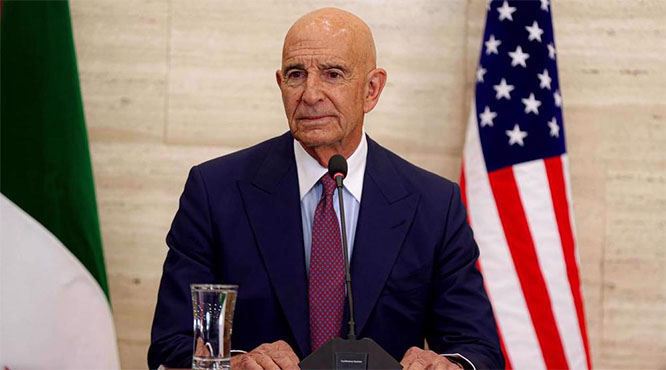
New York: An Indian national enrolled as a postdoctoral fellow in the US has been detained by immigration authorities, said a media report, less than a week after a Columbia student from India self-deported following allegations of activities supporting Hamas.
Badar Khan Suri's lawyer claimed that he is being punished “because of the Palestinian heritage of his wife — who is a US citizen — and because the government suspects that he and his wife oppose US foreign policy toward Israel.”
He is a former student of Jamia Millia Islamia, New Delhi.
Suri is currently a postdoctoral fellow at the Alwaleed Bin Talal Center for Muslim-Christian Understanding at the Edmund A Walsh School of Foreign Service, Georgetown University, Washington DC.
A report in Politico said that Suri, who was studying and teaching on a student visa, has been “detained by federal immigration authorities amid the Trump administration’s crackdown on student activists whom the government accuses of opposing American foreign policy.”
The report said that “masked agents” arrested Suri from outside his home in Virginia Monday night.
A petition filed by his lawyer Hassan Ahmad said that he was taken to a facility in Virginia and is “expected to be transferred soon to a detention centre in Texas.”
The Politico report said that Suri’s lawyer has filed a lawsuit for his immediate release.
“The agents identified themselves as being with the Department of Homeland Security and told him the government had revoked his visa,” the lawsuit says, according to the Politico report.
The report added that according to Suri’s petition, he was put in “deportation proceedings under the same rarely used provision of immigration law” that the government has invoked to try to deport Mahmoud Khalil, the Columbia University graduate and legal permanent resident arrested for his role in leading campus protests at Columbia against Israel.
The petition says the couple has “long been doxxed and smeared” on anonymously run, far-right websites due to their support for Palestinian rights. The petition adds that Suri’s wife Mapheze Saleh has been alleged to have “ties with Hamas” and once worked for Al Jazeera.
The petition further notes that Suri has no criminal record and has not been charged with a crime. Ahmad said he had not been able to contact Suri as of Wednesday evening.
“We’re trying to speak with him. That hasn’t happened yet,” Ahmad said.
“This is just another example of our government abducting people the same way they abducted Khalil.”
According to his profile on the website of Georgetown University, Suri completed his PhD in Peace & Conflict Studies from Nelson Mandela Center for Peace and Conflict Resolution, Jamia Millia Islamia, New Delhi in 2020.
He wrote his thesis on Transitional Democracy, Divided Societies and Prospects for Peace: A Study of State Building in Afghanistan and Iraq in which he underlined the complexities involved in introducing democracy in ethnically diverse societies; as well as challenges to project state building.
He has travelled extensively in the conflict zones of India, Pakistan, Balochistan in Iran, Iran, Turkey, Kurdish Areas in Turkey, Syria, Lebanon and its southern region, Egypt and Palestine.
The Politico report quoted a statement from a Georgetown spokesperson as saying that Suri is an "Indian national who was duly granted a visa to enter the United States to continue his doctoral research on peacebuilding in Iraq and Afghanistan.
"We are not aware of him engaging in any illegal activity, and we have not received a reason for his detention. We support our community members’ rights to free and open inquiry, deliberation and debate, even if the underlying ideas may be difficult, controversial or objectionable. We expect the legal system to adjudicate this case fairly," the spokesperson said.
Suri's detention comes less than a week after Ranjani Srinivasan, an Indian student at Columbia University, self-deported after her visa was revoked for allegedly “advocating for violence and terrorism” and involvement in activities supporting Hamas.
Srinivasan had entered the United States on an F-1 student visa as a doctoral student in Urban Planning at Columbia University, the Department of Homeland Security had said.
It added that Srinivasan was “involved in activities supporting” Hamas, a terrorist organisation.
The Department of State had revoked her visa on March 5. The Department of Homeland Security said it has obtained video footage of Srinivasan using the Customs and Border Protection (CBP) Home App to self-deport on March 11.







Comments
Add new comment